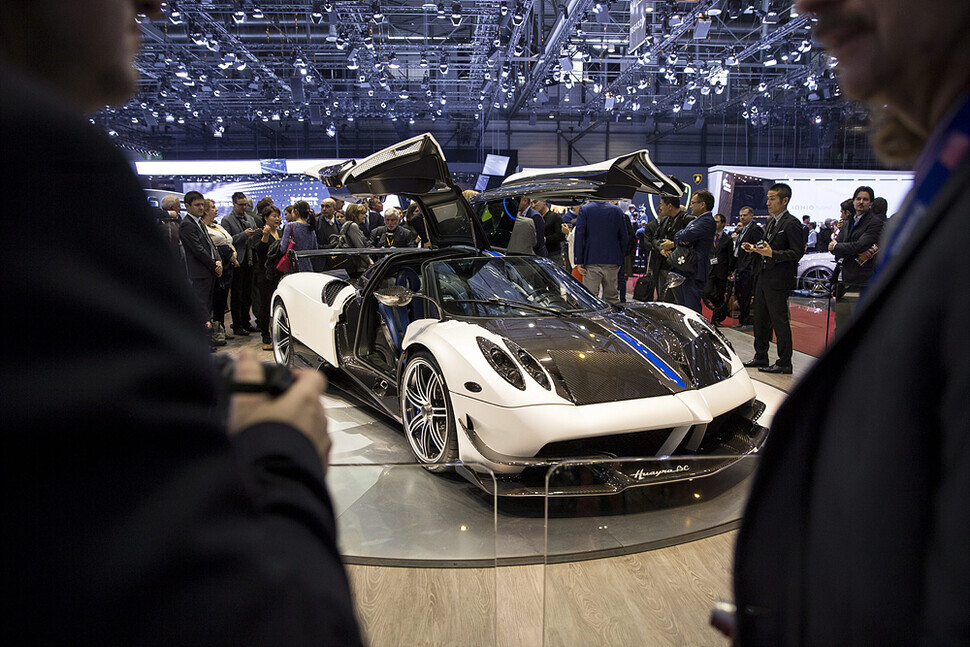hankyoreh
Links to other country sites 다른 나라 사이트 링크
People increasingly registered flashy supercars as “company vehicles” to evade taxes

With Korea’s tax authorities auditing company owners who’d bought supercars for private use but registered them under their company’s name, there’s growing awareness that flashy company cars are being used in tax evasion
According to figures that the Hankyoreh received from the Ministry of Land, Infrastructure and Transport on June 10, a total of 188,429 imported vehicles with an acquisition price of at least 100 million won (US$83,070) are on the government registry as of June 7. More than half, or 51.8% (97,533), of those vehicles are owned by a corporation or business operator. The other 48.2% (90,896) are privately owned.
When acquisition price is broken down into segments, corporation or business operator ownership accounted for 51.7% (97,157) of 187,744 vehicles worth 100-500 million won (US$83,055-415,277), 60.8% (351) of 577 vehicles worth 500 million-1 billion won (US$830,555), and 23.1% (25) of 108 vehicles worth more than 1 billion won.
The National Tax Service (NTS) launched an investigation of several vehicles nominally registered as company cars but actually used privately. Nine of the 24 individuals who the NTS announced it was auditing on June 8 owned a total of 41 supercars under their company name. All nine of those individuals owned at least two; one owned seven, three owned six, and one owned five. The vehicles in question were reportedly manufactured by famous sports car brands such as Lamborghini and Porsche, costing hundreds of millions of won.
These individuals allowed their spouses and children to put these “company cars” to private use, while placing the related expenses on the company books. That amounts to tax evasion, since higher company expenses mean less profits, reducing the amount of income taxes for which a company is liable.
Foreign countries, including the US and the UK, are stricter than South Korea in their treatment of company cars; in those countries, even commuting to work is treated as private usage. Canada only allows depreciation deductions for vehicles worth less than 27 million won (US$22,422), while Australia only allows expenses to be deducted for vehicles worth less than 50 million won (US$41,521).
In the past, South Korea didn’t limit the amount of expenses that could be deducted for company cars, with the effect that the more expensive the car, the more taxes could be saved. In order to close this loophole, the government placed further regulations on deductions for company cars in 2016.
Depreciation, the biggest vehicle-related cost, was capped at 8 million won (US$6,643) a year. Companies are also allowed to deduct up to 15 million won (US$12,456) in yearly expenses for lease, fuel, and tolls without keeping an operation log. When those expenses exceed 15 million won (US$12,456), the authorities are supposed to review the operation log to determine which expenses are actually related to business use, and thus eligible for deduction.
But it would be impossible for the authorities to review all driving records for the numerous company cars in the country, which has enabled a steady stream of fraudulent record-keeping. The NTS plans to use this audit to look into ways of strengthening regulations and verification for private vehicles that are company cars in name only.
By Lee Kyung-mi, staff reporter
Please direct comments or questions to [english@hani.co.kr]

Editorial・opinion
![[Column] Season 2 of special prosecutor probe may be coming to Korea soon [Column] Season 2 of special prosecutor probe may be coming to Korea soon](https://flexible.img.hani.co.kr/flexible/normal/500/300/imgdb/original/2024/0426/3317141030699447.jpg) [Column] Season 2 of special prosecutor probe may be coming to Korea soon
[Column] Season 2 of special prosecutor probe may be coming to Korea soon![[Column] Park Geun-hye déjà vu in Yoon Suk-yeol [Column] Park Geun-hye déjà vu in Yoon Suk-yeol](https://flexible.img.hani.co.kr/flexible/normal/500/300/imgdb/original/2024/0424/651713945113788.jpg) [Column] Park Geun-hye déjà vu in Yoon Suk-yeol
[Column] Park Geun-hye déjà vu in Yoon Suk-yeol- [Editorial] New weight of N. Korea’s nuclear threats makes dialogue all the more urgent
- [Guest essay] The real reason Korea’s new right wants to dub Rhee a founding father
- [Column] ‘Choson’: Is it time we start referring to N. Korea in its own terms?
- [Editorial] Japan’s rewriting of history with Korea has gone too far
- [Column] The president’s questionable capacity for dialogue
- [Column] Are chaebol firms just pizza pies for families to divvy up as they please?
- [Column] Has Korea, too, crossed the Rubicon on China?
- [Correspondent’s column] In Japan’s alliance with US, echoes of its past alliances with UK
Most viewed articles
- 1Division commander ordered troops to enter raging flood waters before Marine died, survivor says
- 2‘We must say no’: Seoul defense chief on Korean, USFK involvement in hypothetical Taiwan crisis
- 3Is N. Korea threatening to test nukes in response to possible new US-led sanctions body?
- 4No good, very bad game for Korea puts it out of Olympics for first time since 1988
- 5Korea’s 1.3% growth in Q1 signals ‘textbook’ return to growth, says government
- 6US overtakes China as Korea’s top export market, prompting trade sanction jitters
- 7[Column] Has Korea, too, crossed the Rubicon on China?
- 8[Column] ‘Choson’: Is it time we start referring to N. Korea in its own terms?
- 9Will NewJeans end up collateral damage in internal feud at K-pop juggernaut Hybe?
- 10Samsung subcontractor worker commits suicide from work stress